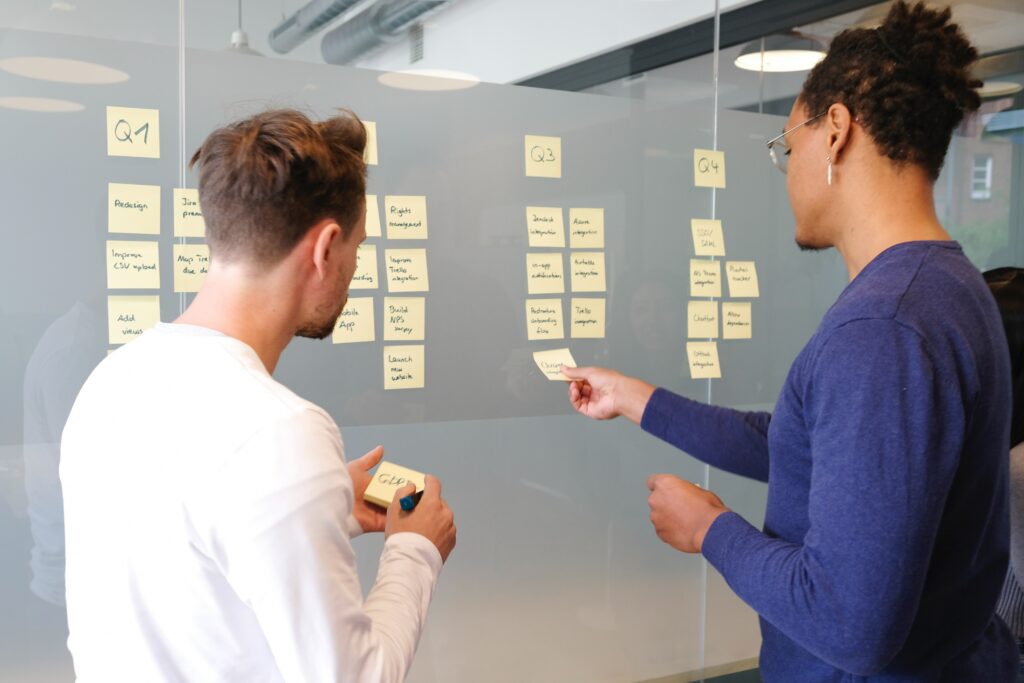In today's fast-paced and competitive business landscape, fostering collaboration and boosting team performance are desirable qualities essential for success. A highly productive team that works together seamlessly can overcome challenges, innovate, and deliver exceptional results. But how can organizations cultivate a collaborative culture and enhance team performance? This article will explore ten key factors that can significantly impact your team's collaboration and performance.
Boosting Team Culture and Productivity Through Collaboration
Effective collaboration is the cornerstone of a healthy and thriving team culture. When team members actively collaborate, they tap into a collective intelligence that leads to ingenious ideas and solutions. Moreover, collaboration fosters trust, respect, and a sense of belonging, which boosts team morale and productivity.
Craft Impactful Team Development Programs
One effective way to unleash the power of collaboration is through team development programs. These programs allow team members to engage in collaborative activities like brainstorming sessions, group projects, and team-building exercises. Participating in these initiatives teaches team members to share ideas, listen to others, and work together towards common goals.
Invest in Resources that Lead to Growth
Investing resources in team development can yield substantial benefits for your organization. It enhances individual skills and strengthens team dynamics and overall performance. Team development programs offer a safe space for team members to practice collaboration, communication, and problem-solving skills, which they can apply to their daily work.
Furthermore, collaboration in the workplace promotes innovation and creativity. When team members collaborate, they bring diverse perspectives and experiences to the table, which can lead to breakthrough ideas and solutions. By encouraging open communication and collaboration, organizations create an environment where creativity thrives and new possibilities emerge.
Create Opportunities for Open Collaboration
Collaboration also plays a crucial role in fostering a positive work culture. When team members collaborate effectively, they build strong relationships based on trust and respect. This camaraderie and unity creates a supportive work environment where individuals feel valued and motivated. As a result, team members are more likely to go the extra mile, take ownership of their work, and contribute to the team's overall success.
Moreover, collaboration enhances problem-solving capabilities within a team. When faced with challenges or obstacles, a collaborative team can pool their knowledge, skills, and resources to find innovative solutions. By leveraging the team's collective intelligence, organizations can overcome complex problems more efficiently and effectively.
Leverage Technology to Make Collaboration Easier
In addition to team development programs, organizations can also foster collaboration through the use of technology. Collaborative tools and platforms, such as project management software, communication apps, and virtual meeting platforms, enable team members to collaborate seamlessly, regardless of their geographic location. These tools facilitate real-time communication, file sharing, and task management, making collaboration more efficient and accessible.
Ultimately, a culture of collaboration not only benefits the team but also the organization as a whole. It increases productivity, improves decision-making, and a more decisive competitive advantage. By investing in collaboration and team development, organizations can create a work environment that nurtures creativity, fosters innovation, and drives success.

The Value of Investing in Team Development
Team development plays a pivotal role in driving high performance within organizations. Through targeted initiatives, teams can enhance their abilities to work together effectively, resulting in improved efficiency, productivity, and quality of work.
Building a strong foundation is crucial for team development. Organizations prioritizing team development create an environment that encourages continuous learning and growth. Organizations foster a culture of excellence and propel their teams toward success by providing team members with the resources, support, and opportunities to develop their skills.
An overall Positive Impact on Business Performance
Investing in team development not only benefits the individuals within the team but also has a positive impact on the overall organization. When teams can develop their skills and work together cohesively, they become more innovative and adaptable. This enables them to tackle complex challenges and find creative solutions, ultimately driving the organization forward.
Furthermore, team development initiatives can help improve communication and collaboration within teams. By providing training and workshops focused on effective communication, teams can learn how to express their ideas, listen actively, and resolve conflicts constructively. This creates a more harmonious work environment where ideas are freely shared, and everyone feels valued and heard.
This also fosters a sense of belonging and camaraderie among team members. When individuals feel supported and valued, they are more likely to be engaged and motivated in their work. This sense of belonging creates a positive team culture where team members trust and rely on each other, leading to higher job satisfaction and retention.
Team development initiatives can take various forms, including team-building activities, leadership development programs, and skills training workshops. These initiatives can be tailored to the specific needs and goals of the team, ensuring that the investment in team development is targeted and impactful.
Enhancing your Business Reputation
Moreover, investing in team development demonstrates a commitment to employee growth and development, which can enhance the organization's reputation as an employer of choice. When potential candidates see that an organization values its employees and invests in their professional development, they are more likely to be attracted to join the team. This can help attract top talent and give the organization a competitive edge in the market.
Placing an emphasis on team development is a strategic decision that yields numerous benefits for both individuals and organizations. By prioritizing team development, organizations can create a culture of continuous learning, improve communication and collaboration, foster a sense of belonging, and attract top talent. These investments in team development ultimately lead to higher performance, productivity, and success for the organization.

Embracing Growth: The Case for Team Development Programs
To implement successful team development programs, organizations need to focus on critical elements that drive effectiveness. These elements include clear goals and objectives, tailored learning experiences, ongoing feedback and coaching, and opportunities for reflection and self-assessment.
Maximizing team potential is another critical factor in fostering collaboration and boosting team performance. Investing in the development of team members enables them to unlock their strengths, mitigate weaknesses, and excel in their roles. When team members feel supported in their growth, they become more engaged, motivated, and committed to the team's success.
Setting Clear Goals and Objectives
Clear goals and objectives provide teams with a sense of direction and purpose. When team members understand what they are working towards, they can align their efforts and work together towards a common goal. This clarity also helps prioritize tasks and make informed decisions, increasing productivity and efficiency.
Tailored learning experiences are essential for team development. Every team is unique, with its strengths and areas for improvement. By customizing learning experiences to address specific team dynamics and challenges, organizations can ensure that team members acquire the necessary skills and knowledge to perform at their best. This tailored approach also fosters a sense of inclusivity, as team members feel that their needs are being recognized and addressed.
Ongoing feedback and coaching are crucial for continuous improvement. By providing regular feedback and coaching sessions, organizations can help team members identify their strengths and areas for growth. This feedback loop allows for timely course correction and ensures team members constantly learn and develop. It also promotes open communication and trust, as team members feel comfortable sharing their thoughts and ideas.
Clear Performance Evaluation Guidelines
Opportunities for reflection and self-assessment enable team members to evaluate their performance and identify areas for improvement. By encouraging self-reflection, organizations empower team members to take ownership of their development and growth. This self-assessment process also helps team members identify their strengths and leverage them effectively within the team. It promotes a growth mindset and a culture of continuous learning.
Investing in the development of team members not only benefits individuals but also the team as a whole. When team members can enhance their skills and knowledge, they become more confident in their abilities.
This confidence translates into higher engagement and motivation, as team members feel empowered to take on new challenges and contribute to the team's success. It also fosters a sense of camaraderie and collaboration as team members support and encourage each other's growth.
Team development programs are essential for organizations looking to maximize team potential and drive performance. Organizations can create an environment that fosters growth and development by focusing on clear goals and objectives, tailored learning experiences, ongoing feedback and coaching, and opportunities for reflection and self-assessment. Investing in team members' growth benefits individuals and the team as a whole, leading to increased engagement, motivation, and commitment to success.
Creating a Thriving Team Culture: The Role of Team Development
Implementing successful team development programs requires strategic planning and effective implementation. Organizations should consider strategies such as aligning team development initiatives with business objectives, fostering a culture of continuous learning, and empowering team leaders to drive the development process.
Unlocking team success requires a multi-faceted approach that incorporates various team development initiatives. These programs can include workshops, training sessions, mentoring programs, and collaborative projects. By providing a range of opportunities, organizations enable teams to develop diverse skills and competencies that are essential for working collaboratively in different contexts.
Holding Workshops & Training Sessions
Workshops are valuable for team development as they provide a structured learning environment where team members can acquire new knowledge and skills. These sessions can focus on topics such as effective communication, conflict resolution, and problem-solving techniques. Through interactive activities and group discussions, team members can enhance their understanding of these concepts and apply them to real-life situations.
In addition to workshops, training sessions offer a more in-depth exploration of specific areas of team development. These sessions can be led by internal experts or external trainers specializing in team dynamics and collaboration. By delving deeper into topics such as team building, trust-building, and decision-making, team members can better understand the factors that contribute to a thriving team culture.
Creating a Solid Mentor Program
Mentoring programs are another effective way to foster team development. Pairing experienced team members with less experienced ones allows for transferring knowledge and skills. Mentors can provide guidance, support, and feedback to mentees, helping them navigate challenges and develop professionally. This one-on-one relationship creates a supportive environment where team members can learn from each other and grow together.
Collaborative projects are an excellent opportunity for team members to practice their skills and knowledge. By working together on a common goal, teams can develop their problem-solving abilities, enhance their communication skills, and build trust among team members. Collaborative projects also encourage creativity and innovation, as team members bring their unique perspectives and expertise to the table.
Providing Your Team with the Right Resources
Furthermore, organizations can foster a culture of continuous learning by providing resources and support for team members to develop their skills further. This can include access to online courses, professional development opportunities, and ongoing coaching. By investing in the growth and development of their teams, organizations demonstrate their commitment to creating a thriving team culture.
Team development is crucial in creating a thriving team culture. By implementing a range of initiatives such as workshops, training sessions, mentoring programs, and collaborative projects, organizations can empower their teams to develop the skills and competencies necessary for success. Additionally, fostering a culture of continuous learning and providing resources for further development ensures that teams can adapt and thrive in an ever-changing business environment.
Fostering Collaboration and Adaptability: The Benefits of Team Development
Team development not only enhances collaboration but also nurtures adaptability and innovation. In today's rapidly changing business landscape, organizations must be agile and able to adapt to new technologies, market trends, and customer demands.
By investing in team development, organizations empower their teams to embrace change, think creatively, and find innovative solutions to complex problems. Team members who have undergone development programs have the confidence and skills to approach challenges with agility and adaptability, enabling them to thrive in a dynamic environment.

Investing in Your Team: A Path to Sustainable Success
Ultimately, investing in team development is an investment in the long-term success of your organization. The entire organization benefits when teams collaborate effectively and perform at their best. Productivity increases, employee engagement improves, and the organization becomes more resilient and adaptable in the face of change.
By prioritizing collaboration and team development, organizations can harness the power of their teams and unleash their full potential. Collaboration becomes the norm, and innovation flourishes. As organizations navigate the complexities of the modern business world, fostering cooperation and boosting team performance are crucial for sustained success.
Explore the Path to Success with CorEthos
Thank you for journeying with us through this exploration of ideas. Your presence here is a testament to a shared passion for reimagining business, and it resonates with the essence of CorEthos: bringing humanity back to business.
Perhaps the curiosity that brought you here still burns brightly, yearning for further discovery. In that case, we invite you to delve into our blog, where each article opens new doors to understanding, insight, and growth. They are tailored to leaders like you, eager to unravel the complex tapestry of today's business world.
If you find yourself intrigued by the delicate science behind communication and leadership, why not embark on a journey of discovery with our newsletter? Subscribing is like opening a treasure chest filled with wisdom that connects you to the essence of collaboration and community.
Intensify Your Leadership Journey with Our Mastermind Program
Our newly launched Mastermind Program provides a focused setting for tackling challenges like honing effectiveness, inspiring your team, and mastering the art of delegation. It's a unique space where business acumen meets human-centered values, delivered with the same quality and integrity you expect from CorEthos. Ready to dive deeper into your leadership potential?
We Would Love to Get to Know Your Challenges Better!
Challenges in business? We see them not as stumbling blocks but as opportunities for transformation. Your unique path awaits, beginning with a complimentary consultation with CorEthos. We'll build bridges over obstacles and forge a trail to success, leveraging our three foundational pillars.
Your adventure with CorEthos doesn't have to end here. Let's continue to build, learn, and grow together, reflecting on what makes your business uniquely human. We are your compass, guiding you through the challenges and celebrating the triumphs. Let's begin this exciting journey today.



